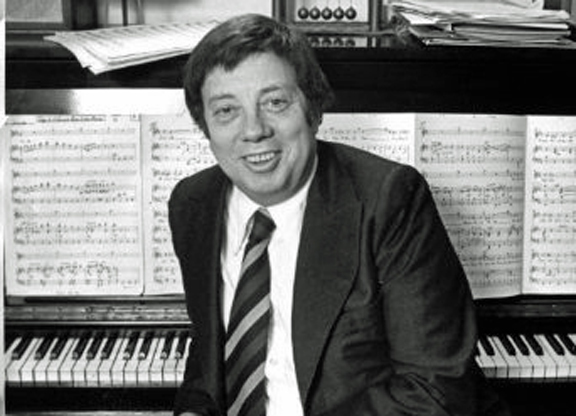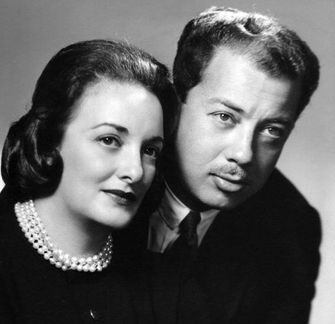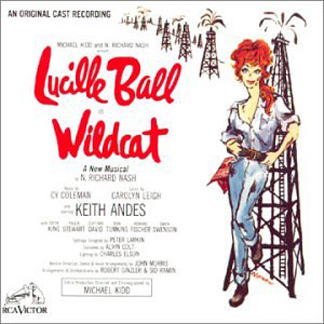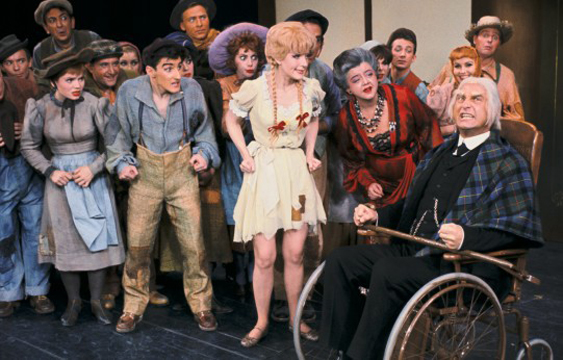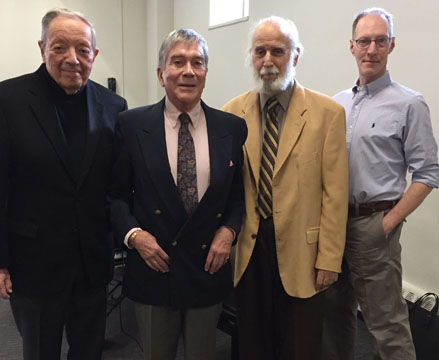by Alix Cohen
Before a memorable Broadway career, Cy Coleman (Seymour Kaufman) 1929-2004 performed classical piano as a child prodigy between ages 6 and 9, led The Cy Coleman (jazz) Trio, and successfully assembled a catalog of popular music. Coleman- musician/ songwriter/ producer, enthusiastically juggled multiple projects until his death. He won five Tonys, two Grammys, and secured an Academy Award nomination.
“The only way to keep writing is to keep writing.” Cy Coleman
Andy Propst, author of the Cy Coleman biography ‘You Fascinate Me So’ is Harvey Granat’s knowledgeable guest. Leaving professional life as a theater critic, Propst approached Coleman’s widow, Shelby, about writing the book. Her reply: “Good luck with it.” I ask him about the tone of her response. “Shelby thought it would be next to impossible to capture all of Cy’s facets in one book. She later told me that she was amazed to find out I had.”
The son of Eastern European immigrants, Seymour Kaufman acquired the piano left behind by a tenant in an apartment building run by his mother. Practice apparently drove his father so crazy, he once literally nailed shut the instrument. Undaunted, the boy took a hammer and pried it open. “He always had healthy self esteem,” Propst comments.
Coleman’s first popular song success was “Why Try to Change Me Now” (with Joseph Allen McCarthy.) Granat performs the tender number showcasing vocal control even with the lightest delivery. Propst looks on with obvious admiration. The composer’s first ongoing, partnership began in 1957 with Carolyn Leigh and “Witchcraft.” As sung by Granat, the number is bouncy and a bit mischievous. Pianist David Lahm effortlessly swings.
When Betty Comden and Adolph Green backed out of the musical Gypsy, Coleman and Leigh sent “Witchcraft,” one of two songs sent to producer David Merrick as audition material. History shows that Stephen Sondheim wanted to do the entire score, but Ethel Merman wanted Jule Styne as the composer and Sondheim as the lyricist.
“The Best is Yet to Come”- notably the inscription on Frank Sinatra’s modest headstone, came next. (Propst visited.) Granat offers it with an anticipatory smile, singing “babe” like vernacular is second nature. Lahm’s musically zigzag arrangement is cool.
Wildcat, marked the Broadway debut of both the collaborators and film/television star, Lucille Ball. In fact, it was Ball’s only experience treading the boards. Audiences expected to see the Lucy they knew and loved from her series and were disappointed, Propst tells us. The show was reconfigured to fit that character further muddling it. A series of health issues then caused Ball to exit. Producers couldn’t find what they felt was a viable alternative and the musical closed. Granat’s stop-start version of “Hey Look Me Over” has ragtime underpinning. “David gets paid by the note,” he quips.
Leigh’s tempestuous nature is exemplified by an incident that took place out of town with the pair’s next venture, Little Me. During a rehearsal, the lyricist noticed some of her words had been changed and erupted. She ran out of the theater returning with a policeman in tow and demanded those responsible be arrested- to no avail, of course.
“Cy and Carolyn were kind of the George and Martha of musical theater,” Propst remarks referring to the battling couple in Who’s Afraid of Virginia Woolf? (Edward Albee). “They worked together until she died, but…” Leigh evidently demanded all of Coleman’s professional attention while the composer insisted on continuing to perform.
Performing two songs from Little Me is veteran supper club performer, Ronny Whyte who was friends with Coleman starting in the late 1960s. “For this song, you have to imagine I’m New York’s oldest living virgin” introduces “Real Live Girl.” The song is waltzy and youthful. Whyte looks tickled pink. In “I’ve Got Your Number” he then manages both to swing and sound conversational. A third offering, “You Fascinate Me So” from Julius Monk’s Demi-Dozen, is as urbane as the performer. Coleman accompanied Whyte on the song at a party just before he died. “What a wonderful memory,” he wistfully recalls.
“I don’t think you could be in his position and not be part of a swinging crowd,” Propst reflects. Coleman was something of a man about town. He wrote the theme for The Playboy Club and became friends with Hugh Hefner.
Dorothy Fields (David Lahm’s mother) was going through a dry spell when she met the composer. She was 25 years his senior and had a notable reputation. When Coleman asked whether the lyricist would work with him she replied, “I thought you’d never ask.” The initial happy result was 1966’s Sweet Charity- nominated for 9 Tonys. David Lahm points out Charity was the first musical not to be set 50 years before its production.
Granat sings “Where Am I Going?” sympathetically wrapped in distress. Piano accompaniment has a dark underbelly. When Shirley MacLaine made the film (Gwen Verdon originated the role), she and Coleman hit it off. He then wrote a couple of her television specials.
“Coleman hated to let a tune go to waste,” Propst observes. “You Fascinate Me So” was originally written for Island Daughters, “Out There” (from Barnum) for Eleanor, a piece about Eleanor Roosevelt that never reached fruition.
Fields died in 1974. The composer believed so strongly in Barnum (written with Michael Stewart), he became one of its producers. Granat calls “The Colors of My Life” descriptive of Coleman’s zest. It was introduced by Glenn Close as the showman’s wife, Charity. The lovely ballad is particularly resonant when performed by someone of a certain age. Vocal and lilting piano do it justice.
Cy Coleman continued to work with other lyricists. Musicals included See Saw, I Love My Wife, On the Twentieth Century, City of Angels, The Will Rogers Follies, and The Life.
We close this afternoon with a jaunty “It’s Not Where You Start” from See Saw. (Dorothy Fields)
It’s not where you start, it’s where you finish./It’s not how you go, it’s how you land./A hundred to one shot, they call him a klutz/ Can out-run the favorite, all he needs is the guts…
Harvey Granat Songs & Stories
92 St Y at Lexington Avenue
November 30, 2018
NEXT: December 13 at 12:00– Harvey Granat Songs & Stories: On Harry Warren
Guests: Julia Riva, Warren’s granddaughter/President of Harry Warren Entertainment and performers Eric Comstock and Barbara Fasano https://www.92y.org/event/songs-and-stories-harry-warren.aspx


